|
|
|
Sort Order |
|
|
|
Items / Page
|
|
|
|
|
|
|
| Srl | Item |
| 1 |
ID:
171074
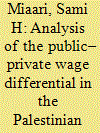

|
|
|
|
|
| Summary/Abstract |
This paper measures and analyzes the dynamics of the public–private wage differential in the West Bank and Gaza for the period before and during the ‘second Intifada’ using data from the Palestinian Labour Force Survey (PLFS) of the Palestinian Central Bureau of Statistics (PCBS). Because the distribution of workers’ individual characteristics, such as skills, and the ‘returns’ to these characteristics may differ across workers, the wage differential is decomposed into two components: an ‘endowment’ effect and a ‘returns’ effect. The results show that in the pre-Intifada period, the wage gap between the public and private sectors narrowed in both the West Bank and Gaza. However, a sharp increase is seen after the outbreak of the Intifada. Moreover, most of this increase comes from an increase in ‘returns’ to skills composition in the public sector, (unexplained effect), rather than a change in the skills composition of public sector workers, (explained effect). Using recent econometric quantile regression techniques, the analysis of the public–private sector wage gap from 1998 to 2006, at various points along the wage distribution, shows that the wage premium, (penalty), for the public sector varies across the distribution, being higher, (lower), at the lowest end of the wage distribution and decreasing (increasing) along the wage distribution; it becomes negative in the top percentiles.
|
|
|
|
|
|
|
|
|
|
|
|
|
|
|
|
| 2 |
ID:
111899


|
|
|
|
|
| Publication |
2012.
|
| Summary/Abstract |
This article presents a regression analysis of some of the factors that influenced the value of the Israeli shekel from 1999 to 2008. The regression results show that changes in domestic expectations for peace in Israel had a significant effect on the value of the shekel. These results combined with a review of the political and economic developments in 2002 suggest that the exchange rate crises in the Israeli foreign currency market in the second quarter of 2002 was due to a decrease in expectations for peace and that the exchange rate stabilized in the end of the quarter due an increase in expectations for peace in Israel in the end of June.
|
|
|
|
|
|
|
|
|
|
|
|
|
|
|
|
| 3 |
ID:
174032
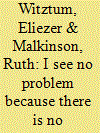

|
|
|
|
|
| Summary/Abstract |
This article discusses denial and silence pertaining to events from the Palestinian Intifada (1987–93) as confronted by medical and mental health professionals. It defines denial from a multidisciplinary perspective comprising psychoanalysis, cognitive psychology, sociology, and medicine, then analyzes personal recollections as well as texts from interviews with psychologists, social workers and psychiatrists. Using the concept of Professional Historical Error, the article shows that some professionals failed to recognise and accept the presence of the Intifada in denying potential mental distress and injuries among soldiers involved in military actions.
|
|
|
|
|
|
|
|
|
|
|
|
|
|
|
|
| 4 |
ID:
142893


|
|
|
|
|
| Summary/Abstract |
Virtually all Palestinians in the Diaspora, and in those parts of Palestine occupied by Israel in 1948, and most non-Palestinian Arabs, feel euphoric about the Intifada – the uprising in the Occupied Territories (OT), that is, the West Bank and Gaza Strip which were occupied in June 1967. The feeling is understandable and justifiable in view of the admirable courage, the cohesiveness, the self-reliance, and the tenacity of the Palestinians of the OT, in conducting an unarmed struggle for liberation against the formidable Israeli military machine. The struggle is all the more admirable as it has been conducted for eleven months now, with no direct, physical participation by any Palestinians from outside the OT, with only marginal external financial support to lighten the extreme economic hardships suffered by the OT, and no more than verbal and mostly lukewarm solidarity from the Arabs – governments and general public alike.
|
|
|
|
|
|
|
|
|
|
|
|
|
|
|
|
| 5 |
ID:
172366
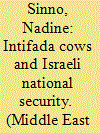

|
|
|
|
|
| Summary/Abstract |
The Wanted 18 narrates the story of a Palestinian town whose residents assert their autonomy by purchasing 18 cows and producing their own milk during the first intifada. In response, the Israeli military declares the cows a ‘threat to the security of Israel’ and hunts down the ‘wanted 18.’ This article provides an analysis of The Wanted 18, focusing on the human-animal interactions. It demonstrates how film directors Amer Shomali and Paul Cowan deploy animal protagonists as a means of exposing anti-Palestinian prejudice, critiquing Israeli occupation and the Palestinian authorities who undermined civil resistance during the first intifada, and elucidating the transformative impact of human-animal companionship and creative resistance in a humorous manner that appeals to a global audience.
|
|
|
|
|
|
|
|
|
|
|
|
|
|
|
|
| 6 |
ID:
106851
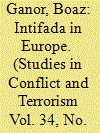

|
|
|
|
|
| Publication |
2011.
|
| Summary/Abstract |
Groups of second- and third-generation Muslim immigrants in Europe are increasingly undergoing radicalization processes that can lead to violent activity. These immigrants find relief for their frustrations in global jihadi ideology and radical Islam. In seeking to understand these radicalization processes within the European context, the author draws lessons from the Palestinian territories of the West Bank and Gaza on the eve of the "First Intifada" (popular uprising) in 1987. While these cases have different root causes and implications, the author's comparative analysis demonstrates that the social processes and generational clashes that lead to radicalization are shared by the two arenas.
|
|
|
|
|
|
|
|
|
|
|
|
|
|
|
|
| 7 |
ID:
118383
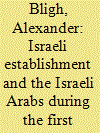

|
|
|
|
|
| Publication |
2013.
|
| Summary/Abstract |
It is impossible to assess the Israeli government activity vis-à-vis the Israeli Arabs during the 1987-92 uprising in the West Bank and Gaza as a success. In terms of policies of active initiative, there were none. Two ministers did take active measures in addressing the development gaps, but that did not deal with the issue of preventing the emergence of a de facto Israeli Arab autonomous system. In shaping passive policies, the response was far from conveying the message to the Israeli Arabs that as full Israeli citizens they were expected to keep a distance from organizations dedicated to the destruction of the Jewish state.
|
|
|
|
|
|
|
|
|
|
|
|
|
|
|
|
| 8 |
ID:
102531
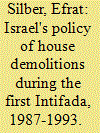

|
|
|
|
|
| Publication |
2011.
|
| Summary/Abstract |
Israel's counter-terrorism policies have often aroused the anger of the Palestinians and the international community. One of the most controversial policies is the demolition and sealing of houses of families connected to a terrorist act. While there is significant media attention on this controversial policy, there have been very few academic studies examining the effectiveness of this policy. This article examines Israel's policy during the first Intifada (1987-1993), administered in accordance with section 119 (1) of the Defence Emergency Regulations of 1945 from the British Mandate government. Based on a carefully structured empirical analysis, the article concludes that the benefits of this policy do not outweigh the costs.
|
|
|
|
|
|
|
|
|
|
|
|
|
|
|
|
| 9 |
ID:
097176
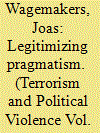

|
|
|
|
|
| Publication |
2010.
|
| Summary/Abstract |
This article shows how Hamas legitimized its policy choices during the Al-Aqsa intifada and the Gaza war. The organization's policy moved from violent during the initial stages of the uprising to more moderate during later years. While this entailed huge changes in the organization's course of action, Hamas nevertheless always managed to frame its choices in a way that seemed consistent with its long-held beliefs. The same occurred during the Gaza war, when Hamas moderated its discourse even further. This shows Hamas' flexibility and pragmatism but also that seemingly rigid ideological views can change quite dramatically when circumstances change too.
|
|
|
|
|
|
|
|
|
|
|
|
|
|
|
|
| 10 |
ID:
175504


|
|
|
|
|
| Summary/Abstract |
This paper studies the gender wage differential in the Palestinian labor market of the West Bank before, during, and in the aftermath of the second Intifada. We combine data on the Palestinian labor force, politically motivated fatalities of Palestinians, and movement restrictions in the West Bank, in order to quantify the effect of political violence on the gender wage gap. We find that political violence during the second Intifada decreased the gender wage gap. We also observe a long-term trend of more women entering the labor force, especially in middle-income occupations where there is an existing large share of female employees. Political violence did not seem to reverse or hurt that trend. We provide suggestive evidence that the reduction in the wage gap is due to the increased supply of low-skilled men, who previously worked in Israel and entered the local labor market due to the Intifada.
|
|
|
|
|
|
|
|
|
|
|
|
|
|
|
|
| 11 |
ID:
139731
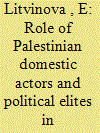

|
|
|
|
|
| Summary/Abstract |
THE ISSUE OF PALESTINE is unique, and not only because it is part and parcel of the Middle East conflict and attempts to solve it. The study of the experience of the political institutionalization of the Arab Palestinian territories, of the structuring of Palestinian political processes, of the activities and split of the Palestinian National Authority (PNA), and of the record of the international community as the "architect" of modern Palestine makes it possible to evaluate the roles of Palestinian domestic actors and political elites, understand internal and external factors in building new states in the Middle East, and assess the effectiveness of proposed systems of political organization.
|
|
|
|
|
|
|
|
|
|
|
|
|
|
|
|
| 12 |
ID:
153239


|
|
|
|
|
| Summary/Abstract |
This article offers a critical comparison between the methods used by Britain in Northern Ireland between 1969 and 1994, and those used by Israel in the West Bank and Gaza between 1987 and 1993. It analyses the dilemmas, difficulties, and obstacles faced by governments in dealing with terrorism. The comparison indicates that despite the differences in the nature of the conflicts, the methods used by both countries were similar. It also suggests that there is equivalency in the retorting principles guiding regimes in the course of emergency situations.
|
|
|
|
|
|
|
|
|
|
|
|
|
|
|
|
| 13 |
ID:
108334
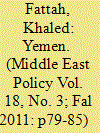

|
|
|
|
|
|
|
|